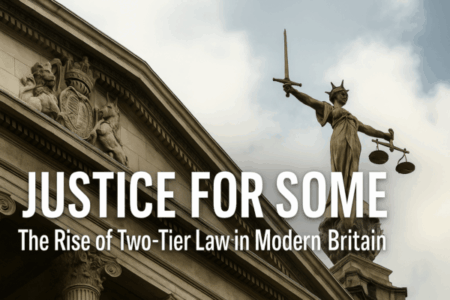For centuries, the idea that justice is blind has formed the bedrock of the British legal tradition. From the Magna Carta to the modern-day courtrooms of the Old Bailey, the promise has always been the same: equal treatment under the law, regardless of wealth, power, or privilege.
But in 21st-century Britain, that ideal lies in tatters.
A yawning gulf has opened between how justice is applied to the political class, celebrities, and protected groups, versus how it is meted out to ordinary, working-class citizens. What we are now witnessing is the emergence of a two-tier justice system—one for the powerful, and another for everyone else.
It is a scandal that cuts to the heart of democracy. It undermines public trust, erodes social cohesion, and leaves the average Briton questioning whether the rule of law still applies in any meaningful sense.
The Political Class: Above the Law?
Let’s begin at the top. Consider the repeated failures to hold senior politicians to account for their actions—whether it’s the expenses scandal, Partygate, or the sheer lack of prosecutions following years of grooming gang cover-ups.
Sir Keir Starmer, during his time as Director of Public Prosecutions (DPP), presided over a Crown Prosecution Service that failed to bring charges in multiple high-profile abuse cases—including those involving Jimmy Savile and the industrial-scale grooming gangs operating in towns like Rotherham and Telford.
When challenged on these decisions, Starmer has claimed ignorance, saying key files “never crossed his desk.” Yet this same man was the head of the department. If responsibility doesn’t rest with him, where does it lie?
Contrast that with how working-class individuals are prosecuted to the full extent of the law for far lesser offences. Benefit fraud involving a few hundred pounds is dealt with swiftly and harshly. Yet when MPs fiddle their expenses to the tune of tens of thousands, justice is often delayed, diluted, or dodged entirely.
It’s not just about outcomes—it’s about the very willingness of the state to pursue justice, depending on who the accused is.

The Police: Politicised and Inconsistent
Policing, too, has become a partisan affair. A string of recent cases demonstrates that law enforcement now enforces ideology more than law.
If you misgender someone on Twitter or post a politically incorrect meme, you may very well receive a visit from the police. In some cases, people have been arrested for “causing offence” online—even when no actual crime was committed.
Yet when actual crimes are reported—burglaries, assaults, or anti-social behaviour—police are often slow to respond, if they respond at all. A staggering number of crimes now go entirely unsolved.
More disturbingly, when it comes to ethnic or religious sensitivity, the police often appear paralysed. The grooming gangs scandal is the most egregious example. In towns across Britain, vulnerable white girls were systematically raped and trafficked by groups of mostly Pakistani-heritage men. The police knew. The social workers knew. And yet, they did nothing for years—for fear of being branded racist.
The result? Thousands of lives shattered—and not a single senior official held accountable.
Yet if a white man makes an off-colour joke online, or criticises Islam in a Facebook post, he risks losing his job or being prosecuted for hate speech. This is not equality before the law. This is ideological policing.
Courts and Sentencing: A Lottery Based on Identity

Our courts are also plagued by inconsistency. Consider the wildly different sentences handed out depending on the race, religion, gender, or sexuality of the accused.
A female teacher caught having sex with a 15-year-old pupil may get a suspended sentence. A male counterpart is far more likely to go to prison. Male domestic abuse victims, meanwhile, are routinely dismissed or disbelieved.
In many “diversity training” sessions within the justice system, intersectionality is prioritised over impartiality. There is a clear pressure to treat some offenders with more leniency if they come from a “marginalised” background—even when the crime is serious.
In 2022, a judge in London gave a reduced sentence to a knife-wielding teenager because he was “disadvantaged” and “lacked father figures.” Try telling that to the grieving family of his victim.
In contrast, lockdown protesters, Christian street preachers, or parents concerned about gender ideology in schools are treated with the full force of the law—often arrested or fined for simply expressing dissent.
This is not blind justice. This is selective enforcement.
The CPS and “Public Interest”
The Crown Prosecution Service (CPS) plays a major role in deciding who gets prosecuted—and why. Increasingly, it is clear that political calculation informs many of these decisions.
For example, prosecutions for “hate incidents” have surged in recent years, even when no crime has been committed. The CPS often claims it’s acting in the “public interest.” But whose public? Whose interest?
Meanwhile, in many cases of burglary, mugging, or even violent assault, prosecutions are dropped or never pursued—because they’re “not in the public interest.” It seems justice is only pursued if it serves the correct narrative.
Media Complicity and the Court of Public Opinion
The mainstream media has played a role in normalising this dual-track approach. High-profile trials of white offenders are broadcast wall-to-wall, while equally horrifying crimes committed by minority groups often go underreported—or are framed through a lens of victimhood.
This distortion affects jury pools, public opinion, and policymaking. If the media downplays the criminality of a certain group, the justice system feels pressure to do the same. The courts should be the last line of defence against media bias. Increasingly, they are not.
Social media, meanwhile, has created a parallel “court of public opinion”—one that is more powerful than ever. Cancel culture, online mobs, and reputational assassinations now function as a form of extrajudicial punishment. And it is used disproportionately against those who dissent from establishment views.
The Cost of Losing Faith in Justice
When the public sees criminals walk free because they tick the right identity boxes, or watch politicians dodge consequences while ordinary citizens are prosecuted for minor infractions, faith in the legal system collapses.
This collapse has real consequences.
- Fewer people report crimes, believing nothing will be done.
- Vigilantism becomes more appealing as formal justice fails.
- Law-abiding citizens lose respect for the rules, feeling them to be arbitrary or unfair.
Worst of all, a two-tier justice system tears apart the social contract. When people feel the law no longer protects them—or worse, targets them—they disengage from society altogether. That is a recipe for disorder, alienation, and civil unrest.
Restoring Equality Before the Law
If Britain is to reclaim its promise of fairness and justice, we must act decisively.
- Depoliticise the police and CPS. End ideological training and restore common-sense, impartial enforcement.
- Hold public officials accountable. No more hiding behind “I didn’t know.” If you’re in charge, you’re responsible.
- Scrutinise sentencing guidelines. Ensure punishments are consistent and based on the crime—not identity politics.
- Protect freedom of speech. The criminal law should not be a tool to silence political dissent or personal opinion.
- Enforce the law fairly. Whether you’re a prince or a pauper, the law should apply equally.
Conclusion
Britain was once a beacon of justice, admired across the world for its legal principles and fair play. But today, we are witnessing its slow, deliberate corrosion. A nation cannot survive when justice is not applied evenly.
The law must not become a tool of the elite, the ideologue, or the activist.
It must be what it was always meant to be: a shield for the innocent, a sword against the guilty—and equal in the hands of all.

